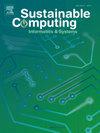A low-latency and area-efficient QCA-based quantum-dot design for next-generation digital sustainable systems
IF 5.7
3区 计算机科学
Q1 COMPUTER SCIENCE, HARDWARE & ARCHITECTURE
引用次数: 0
Abstract
Digital sustainable system plays a vital role in the advancement of dynamic industries, including agriculture, healthcare, smart cities, Edge Artificial Intelligence (AI), and the Internet of Things (IoT), by facilitating high-speed, low-power, and highly compressed processing. These systems are based on the capabilities of real-time execution, processing, and analysis of large-scale information with extreme power and area limitations. However, traditional Arithmetic Logic Units (ALUs) based on complementary metal-oxide semiconductors (CMOS) are becoming challenging in terms of scalability, power consumption, space demand, and nanoscale fabrication. The ALU is one of the most important parts of such systems and has a direct effect on the overall computing performance, but current implementations cannot sustain the requirements of next-generation applications. To overcome these shortcomings, this paper offers an area-efficient and low-latency ALU that can be designed with the quantum-dot cellular automata (QCA) technology, with the advantage of employing area-efficient layout and simple cell design. The proposed QCA-based ALU has high performance, less delay, and less energy consumption, which makes it properly suitable for the next generation of digital sustainable systems applications. The outcome of the simulation indicates that there are considerable performance gains, such as an 82.37% decrease in energy consumption, and a 9.21% decrease in area relative to current available design. These enhancements emphasize the power of QCA technology as a scalable and low-energy consumption alternative to CMOS in the realization of critical computing components in sustainable digital systems.
基于量子点的低延迟和面积高效量子点设计,用于下一代数字可持续系统
数字可持续系统通过促进高速、低功耗和高度压缩的处理,在农业、医疗保健、智慧城市、边缘人工智能(AI)和物联网(IoT)等动态行业的发展中发挥着至关重要的作用。这些系统基于实时执行、处理和分析具有极限功率和面积限制的大规模信息的能力。然而,传统的基于互补金属氧化物半导体(CMOS)的算术逻辑单元(alu)在可扩展性、功耗、空间需求和纳米级制造方面正变得具有挑战性。ALU是此类系统中最重要的部分之一,对整体计算性能有直接影响,但目前的实现无法满足下一代应用程序的需求。为了克服这些缺点,本文提出了一种利用量子点元胞自动机(QCA)技术设计的面积高效、低延迟的ALU,该ALU具有面积高效布局和单元设计简单的优点。所提出的基于qca的ALU具有高性能、低时延、低能耗等特点,适合于下一代数字可持续系统的应用。仿真结果表明,相对于当前可用的设计,该方案具有相当大的性能提升,如能耗降低82.37%,面积减少9.21%。这些增强强调了QCA技术在实现可持续数字系统中的关键计算组件方面作为CMOS的可扩展和低能耗替代品的能力。
本文章由计算机程序翻译,如有差异,请以英文原文为准。
求助全文
约1分钟内获得全文
求助全文
来源期刊

Sustainable Computing-Informatics & Systems
COMPUTER SCIENCE, HARDWARE & ARCHITECTUREC-COMPUTER SCIENCE, INFORMATION SYSTEMS
CiteScore
10.70
自引率
4.40%
发文量
142
期刊介绍:
Sustainable computing is a rapidly expanding research area spanning the fields of computer science and engineering, electrical engineering as well as other engineering disciplines. The aim of Sustainable Computing: Informatics and Systems (SUSCOM) is to publish the myriad research findings related to energy-aware and thermal-aware management of computing resource. Equally important is a spectrum of related research issues such as applications of computing that can have ecological and societal impacts. SUSCOM publishes original and timely research papers and survey articles in current areas of power, energy, temperature, and environment related research areas of current importance to readers. SUSCOM has an editorial board comprising prominent researchers from around the world and selects competitively evaluated peer-reviewed papers.
 求助内容:
求助内容: 应助结果提醒方式:
应助结果提醒方式:


